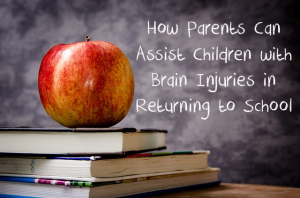Children who have experienced a traumatic brain injury (TBI), ranging from mild to severe, are more likely to face difficulties when returning to school after the incident or after a period of rehabilitation.
Brain injury can lead to struggles with learning, memory, social skills, behaviour, or even physical abilities. This is why it is necessary for parents and teachers to help ease the child through the transition back to school.
Here are some important ways parents can make the transition smoother for their child:
 Share Information with the School and Teachers
Share Information with the School and Teachers
You are your child’s best advocate at school. The school and teachers may not fully understand brain injuries (click here to learn about the common myths about child brain injury). Communicating with them about your specific child’s brain injury, as well as brain injury in general, can help them better accommodate your child over the school year.
You should provide your child’s school and teachers with as much information as possible, including information about:
- Your child’s accident
- How the brain injury is affecting your child (behavioural, cognitive, physical, emotional, social, etc.)
- Your child’s strengths and difficulties
- Medical and rehabilitative treatment your child is undergoing
- Any medication your child is taking
- Suggestions on how to handle the situation if your child experiences an emotional outburst or becomes frustrated when unable to do something
- Any special equipment or considerations your child will require
The more your child’s school and teachers understand about their brain injury, the better they will be able to accommodate them as they transition back into the classroom.
Connect with Your Child’s Classmates
Social relationships at school are an important part of your child’s life. Your child’s classmates will likely be inexperienced with the idea of brain injury. They may assume your child is well because they don’t “look injured” (remember, brain injury is often called the invisible disability).
It can be beneficial to speak with your child’s class and explain what a brain injury is and what it means. Help them understand how brain injury has affected your child and tell them how they can help. Let them ask lots of questions.
Facilitate Communication between Medical Practitioners and the School
If your child is still going through rehabilitation and treatment, their medical practitioners should work with the school to facilitate your child’s learning.
Your child’s brain injury treatment specialists can discuss some key points with your school, such as what the school can to do maximize your child’s ability to learn and expectations for your child’s recovery.
Determine whether Your Child Needs Special Education
In some cases, your child may require education for children with disabilities. Students with brain injury can have unique needs and considerations that must be accommodated for successful learning.
Ask your child’s medical practitioners whether they believe your child should undergo an evaluation for special needs education. If so, they should be able to help you navigate the process of evaluation. You can also ask your child’s principal for guidance on how to pursue a special needs evaluation.
Brain Injury Can Have Long Lasting Effects
Many people with brain injuries do not fully recover; instead, they experience lingering symptoms for years or decades down the road. When a young person suffers a brain injury, it is an especially difficult time for the child and their parents alike.
However, children with brain injuries can still receive a complete education and make the most of their circumstances. As a parent, you can help facilitate this throughout their education using the strategies above.
>> Roger R. Foisy is an experienced Ontario Personal Injury Lawyer with an expertise in brain injury cases. If you or a loved one has sustained a brain injury at another party’s fault, don’t hesitate to contact us today for a free consultation and immediate support.
*Roger R. Foisy has completed courses in Neurorehabilitation, Advanced Brain Injury Rehabilitation, and Neuropsychological Assessments: Beyond Testing from Brock University. However, he is not a medical professional. The advice in this blog is not intended as a substitute for medical advice.
I Encourage You to Watch My Mild Traumatic Brain Injury Video Series:
- What is a Mild Traumatic Brain Injury (mTBI)?
- Why are Mild Traumatic Brain Injuries Often Missed?
- Accessing Funding for Medical Rehabilitation after Suffering a Mild Traumatic Brain Injury in a Motor Vehicle Accident
- Finding the Right Team for Your Mild Traumatic Brain Injury
- Coping with the Emotional and Psychological Impact of a Mild Traumatic Brain Injury

